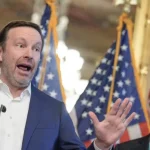
Supreme Court Justice Neil Gorsuch on Wednesday expressed sympathy toward everyday citizens challenging federal agency overreach in courtrooms across the nation, arguing that a long-standing precedent that gives deference to such agencies has created a “disparate impact.”
The nine justices heard two challenges that arose from a 2020 federal regulation forcing owners of fishing vessels in the Atlantic herring fishery to pay for at-sea monitors who collect data and oversee operations on their vessels.

However, the subject of fishing was only seldom mentioned during the more than three hours of oral arguments spread across the cases collectively. Instead, the justices focused on the 1984 legal doctrine known as the Chevron deference, which requires courts to defer to agencies’ interpretation of laws passed by Congress if the interpretation is “reasonable.”
Gorsuch, one of six Republican-appointed justices, stood out as the most ardent backer of the fishermen seeking to uproot Chevron, which the plaintiffs blame for their defeat at the appeals court level in their bid to avoid paying the at-sea monitors nearly $700 for each fishing venture.
“The cases I saw routinely on the courts of appeals — and I think this is what niggles at so many of the lower court judges — are the immigrant, the veteran seeking his benefits, the social security disability applicant, who have no power to influence agencies, who will never capture them, and whose interests are not the sorts of things on which people vote, generally speaking,” Gorsuch told Justice Department Solicitor General Elizabeth Prelogar, who was defending Chevron on behalf of the government.
“And there Chevron is almost always, and in fact I didn’t see a case cited, and perhaps I missed one, where Chevron wound up benefiting those kinds of peoples,” Gorsuch said, adding that “it seems to me that it’s arguable — and certainly the other side makes this argument powerfully — that Chevron has this disparate impact on different classes of persons.”
Gorsuch, one of three appointees of former President Donald Trump, has championed the same calls by conservative judicial advocates for the reverse of the doctrine in question, which gives federal agencies broad authority to impose regulations.
Business groups and conservative court watchers, including a network founded by Charles Koch that has funded the challenge by the fishermen, say Chevron has led to unchecked bureaucracy. Prelogar on Wednesday countered those beliefs by arguing that environmental efforts, public health, and other matters thrive off of agency expertise and uniform rules.
Gorsuch in 2022 notably issued a dissenting statement when his colleagues declined to hear an earlier challenge to Chevron, arguing that “it is time to give the profoundly wrong Chevron doctrine ‘a tombstone no one can miss.’”
Carrie Severino, president of the conservative legal advocacy group JCN, summarized Gorsuch’s remarks as: “How come Chevron never benefits the little guy?”
Gorsuch, appointed to the high court in 2017, is also the son of a former chief of the Environmental Protection Agency, Anne Gorsuch. The mother of the justice was known for being the first female leader in the agency’s history, but her tenure was cut short due to backlash from critics who said her policies weakened federal environmental enforcement.
The majority of the nine justices, six of whom were appointed by Republican presidents, appeared critical of the 1984 precedent. Even if the eventual majority opinion does not upend Chevron, the Supreme Court could also take an alternative approach that would place additional limits on when lower court judges should defer to agencies without necessarily overturning the precedent.
CLICK HERE TO READ MORE FROM THE WASHINGTON EXAMINER
Anastasia Boden, director of Cato Institute’s Center for Constitutional Studies, told the Washington Examiner that courts can take agency interpretations that are “persuasive” into account but should not be pigeonholed into accepting agency interpretation at the expense of “judicial humility.”
“[To force] courts to accept agency interpretations in place of their own is not judicial humility, it is judicial abdication,” Boden said, adding, “As Justice Gorsuch warned, it will come at the expense of politically powerless parties who simply seek to challenge government overreach before a neutral arbiter.”




